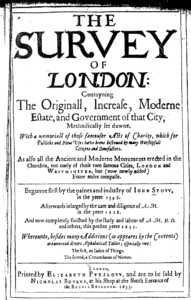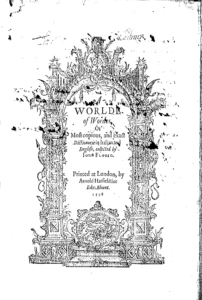[Guest Post from Douglas Clark]
[Written on a non-striking day from the United Kingdom]
Steve and Nicholas asked the participants of the ‘Watery Thinking’ seminar to explore the role that water ‘as a metaphor and feature of the environment’ took in early modern representations of cognition.[1] This stimulus offered an opportunity for the group to blend together scholarship from cognitive studies and the blue, or oceanic, humanities, to refine or perhaps redefine our understanding of period’s literature. Lyn Tribble’s previous blog post encouraged us as a group to reflect on the staging of immersion in early modern drama, and the broader interplay of ‘imagination, physiology, skill and affect’ in literary ‘waterscapes’.[2] The papers in the ‘Fluid Cognition’ sub-group address the presence of hydrological thinking in early modern historical writing and the dramatic presentation of watery ‘perturbations of the minde’ in Shakespeare’s canon.[3]

Andrew Brown’s paper on ‘Memory, Loss, and Infrastructural Thinking in Early Modern Texts’ examines John Stow’s Survey of London (1598) and Marc Lescarbot’s Histoire de la Nouvelle-France (1609). Brown neatly demonstrates how the ‘extraction and management’ (page 2) of water is used in these texts to memorialise London’s past, and to frame the interaction between French colonists and their attempted mastery over the environment of Nova Scotia. Fresh emphasis is placed on the role that subterranean waterflows take as active agents in the reformation of London’s environment, in addition to the potential connections that may be made between the ‘aquatic entertainment[s]’ (page 8) produced in early seventeenth-century London and the French colony of Port-Royal. Attending to the shifting flow of waters in England and the new world may illuminate how key ‘infrastructural thinking’ (page 11) was to the early modern civic and colonial imagination. Taking Brown’s thesis into account, I wonder what further work needs to be done to address the importance of hydrological thinking in early modern European historiography and literature. Brown’s work opens up some exciting routes for future research to take.
Benjamin Bertram’s paper, on the other hand, addresses a classic problem associated with character studies of early modern drama: how should we approach claims for the presence of psychological realism in Shakespeare’s canon, and what place should the pursuit of identifying the genesis of “authentic” modes of subjectivity take in the field’s development? Bertram places emphasis on the humoral and elemental construction of Richard of Gloucester’s dramatic subjectivity through the Henry VI plays and Richard III, with the aim to ‘rethink the human-centered narratives of Richard’s development’ (page 12) in line with an ecological understanding of emotional turmoil. Combining Bertram’s approach with the scholarship already completed on grief, anger, and emotional affect could be profitable.[4] Bertram’s stimulating reappraisal of Richard’s psychogenesis also chimes well with the resurgence of critical interest in character studies, and the difficulties associated with appraising the psychological complexity of dramatic personae.[5] Bertram’s work shows how the artifice of interiority presented in dramatic works may be further understood by attending to the liquid imagery associated with the presentation of self-knowledge.

My own paper addresses the terms that we use, and that early modern writers used, to describe and define mental activity. I suggest that we may re-orientate the way we understand the texts of the period by attending to the definition that sixteenth- and seventeenth-century writers made between cogitation and cognition. Take John Florio’s entry for these terms in his A World of Wordes (1598) for instance: ‘Cogitatione, musing, thinking,cogitation … Cognitione, an acknowledgement, a recognison.’[6] This kind of distinction between ‘cogitation’ as ‘thinking’ and ‘cognition’ as the ‘recognison’ of knowledge is found in a range of early modern works. My paper attends to the place that concepts of cogitation take in early modern philological and philosophical texts, as a way to appraise incidents of mental disturbance and mind travel that centre around watery environments in Cymbeline and Merchant of Venice. Ultimately, I query what new directions may we take in our examination of the history of the mind by examining the cogitative principles of early modern writing.
All three papers in this sub-group address the preoccupation that early modern texts had with mental, corporeal, and environment disturbances caused by the flow and flux of water. I hope that this group’s efforts help the seminar as a whole to think more fluidly about the place that watery modes of cognition took in the literature of the period.
[1] See the entry for Seminar 58: http://www.shakespeareassociation.org/annual-meetings/seminars-and-workshops-2/.
[2] See ‘Watery Thinking 2: Submersive Tendencies’: https://stevementz.com/watery-thinking-2-submersive-tendencies/.
[3] James Perrott, The First Part of the Consideration of Humane Condition (Oxford: 1600), sig. G3v.
[4] See: Elizabeth Hodgson, Grief and Women Writers in the English Renaissance (Cambridge: Cambridge University Press, 2015); Gwynne Kennedy, Just Anger: Representing Women’s Anger in Early Modern England (Carbondale and Edwardsville: Southern Illinois University Press, 2000); Erin Sullivan, Beyond Melancholy: Sadness and Selfhood in Renaissance England (Oxford: Oxford University Press, 2016); Jennifer C. Vaught, Masculinity and Emotion in Early Modern English Literature (Farnham: Ashgate, 2008).
[5] Nicholas R. Helms, Cognition, Mindreading, and Shakespeare’s Characters (London: Palgrave, 2019); Jelena Marelj, Shakespearean Character: Language in Performance (London: Bloomsbury, 2019).
[6] John Florio, A VVorlde of Wordes (London, 1598), sig. G2v.